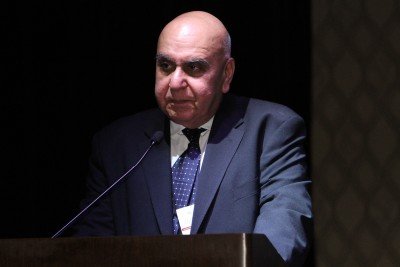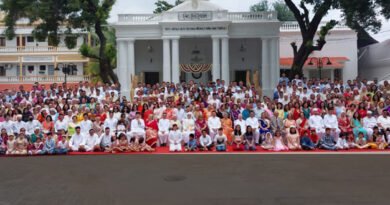Zoroastrianism in Iraq seeks official recognition
SULAIMANIYAH, Iraq — Zoroastrianism is the world’s oldest religion based on divine revelation, which served as the state religion of three great Iranian empires for 12 centuries, from the sixth century B.C. until the seventh century.
While religious diversity is now facing an imminent demise in Middle Eastern countries — especially in Syria and Iraq — the events following the rise of the Islamic State (IS) and its threat to this diversity has made it easier for the adherents of Zoroastrianism to reveal themselves after they had hidden their religion for 15 centuries and to convert to the new religion, in the aftermath of the Muslim conquest of Iraq.
Zoroastrians today are present in several areas of Iraqi Kurdistan and other areas administratively affiliated with the Iraqi federal government. But there are no accurate figures of their numbers as they are still referred to as “Muslims” on their identity documents, even though they engage in Zoroastrian religious rituals. This represents a restriction on their right to freedom of belief, especially since converting from Islam to another religion is considered a crime according to the Personal Status Law.
At the Zoroastrian Cultural and Heritage Center in Sulaimaniyah — which contains a small temple where Zoroastrian rituals are being held for the first time in modern Iraqi history — Peer Luqman Haji, the spiritual leader of Iraqi Zoroastrians, administers the conversion from Islam to Zoroastrianism through the Kushti tying ceremony (a Kushti is the sacred girdle worn by Zoroastrians around their waists) and marriage ceremonies according to the Zoroastrian tradition.
Haji talked to Al-Monitor from this small temple in Sulaimaniyah about the extent of the recognition of Zoroastrianism in Iraq, the number of followers and places of their presence. He also addressed the controversy surrounding the return of this ancient religion after it had disappeared for centuries and how this relates to the emergence of IS and its occupation of large parts of the country. Haji also clarified the Kurds’ search for a religious identity other than Islam, in addition to the reactions of Islamic religious circles regarding the return of this ancient religion that has resulted in many Muslims converting to Zoroastrianism.
As far as Haji is concerned, what he is doing is not merely a religious representation of a millennia-old religion, but a cultural revolution seeking to direct the hearts and minds of people toward a loving life and adopting moderation in a country threatened with segregation due to ethnic tensions. He is confident that his revolution will have a positive outcome on the country.
The full text of the interview follows.
Al-Monitor: Is Zoroastrianism an officially recognized religion in Iraqi Kurdistan? And what are the limits of such recognition?
Haji: Zoroastrianism is recognized as one of the religious beliefs as per Law No. 5 of Protecting Components of Iraqi Kurdistan of 2015, which is new and positive. This encouraged us to officially establish this place [Zoroastrian Cultural and Heritage Center] representing Zoroastrians, after an absence of centuries. We also have an official representative at the Ministry of Endowments and Religious Affairs, and this is considered a step forward on the path to official recognition. But we do not think these steps are enough for us to act freely, as the ministry has yet to recognize this place as a house of worship for Zoroastrianism, just like mosques and churches. We demand this, so we can have a house of worship that symbolizes our existence and therefore earns us legal protection.
I have been to the Ministry of Endowments and Religious Affairs in Iraqi Kurdistan 12 times since September 2015, met with the minister on five occasions and asked for official recognition, particularly for the Zoroastrian Cultural and Heritage Center as a place that represents us from a religious point of view. The center has already been recognized as a nonprofit organization by the NGO Directorate. This means that the recognition of Zoroastrianism has not yet reached the point of giving us a temple to perform religious rituals, or at least recognizing the center as a house of worship or religious center. And it should be noted that the opening of the center was attended by a representative from the Ministry of Endowments and Religious Affairs. That same day — on Dec. 20, 2015 — we presented a memo to the ministry demanding that the center be recognized.
Al-Monitor: So you are saying that legal recognition of Zoroastrianism did not reach the point of equality with other religions? What aspects of equality are you demanding?
Haji: First, we demand the recognition of this place and the small temple built in it as a house of worship for Zoroastrianism. We also demand that Zoroastrian clerics are recognized just like Christian, Muslim and Zaidi clerics. For example, as the spiritual leader of Zoroastrianism, I have a diploma in Zoroastrian theology from the Zoroastrian school in France. I have earned the rank of “peer,” which is the first rank in the hierarchy of Zoroastrian priesthood and the highest religious rank obtained by a Zoroastrian in Iraq. It was an intricate procedure, for — after earning my diploma in Zoroastrian theology — I had to be officially nominated to represent Zoroastrianism and be officially chosen by the Zoroastrian council in the United Kingdom, which indeed happened. But the Ministry of Endowments has yet to recognize me as a representative of the religion; I am working on this.
Al-Monitor: Were you the first to demand the recognition of Zoroastrianism after centuries of its decline in Iraq, or were there other historical demands?
Haji: I don’t think Zoroastrianism really disappeared throughout that time, but it was indeed occulted since human beings have no power over their hearts and spirits, so they would hide their true beliefs for fear of persecution without abandoning them completely. I will give you an example: A Zoroastrian from Khanaqin in the Diyala governorate told me that his grandfather presented an official memo to the Iraqi court in 1924, demanding that Zoroastrianism was stated as his religion on his official documents. But his demand was rejected since Zoroastrianism was not one of the officially recognized religions upon the foundation of modern Iraq. This shows that Zoroastrians have not ceased to demand recognition throughout the past centuries and that political, religious and social reasons have forced them to hide their religious identity — just like they are doing today in fear of the reaction of radical Islamists. As a result, many of them have to go to mosques for prayer so that they are not accused of being Zoroastrian and deemed unbelievers for that. Their ID cards still label them as “Muslim.”
Al-Monitor: Are there any accurate or at least approximate statistics concerning the number of Zoroastrians or those who are adhering to it today in Iraq?
Haji: The number of Zoroastrians in Iraqi Kurdistan and other regions is unknown, and I don’t intend to hide these figures because I actually have no idea about the approximate number of public or secret adherents to the Zoroastrian faith. I receive new adherents each day in this temple. They are revealing their true religious beliefs after decades of hiding them or inheriting them from their fathers and grandfathers without being able to go public, until they now finally get the opportunity.
Al-Monitor: How are Zoroastrians distributed across the different regions of Iraq?
Haji: Each day, we discover new stories about Zoroastrians in many areas of Iraqi Kurdistan and others that are administratively part of the [Iraqi] federal government. Zoroastrians are [mainly] found in Dahuk province, in the city of Zakho in the far north [near the northern borders with Turkey] and in Sulaimaniyah province, notably the districts of Darbandikhan, Ranya, Qalaat Daza and Chamchamal. They are also concentrated in Halabja province and in Erbil province, notably Koysinjaq district and Koya near Koysinjaq. Zoroastrians reside in Daquq [district] and Altun Kupri [northwest of Kirkuk] in Kirkuk province; in Khanaqin and Kafri in Diyala province; in Tuz Khormato [administratively part of Salahuddin province] in Kalar district linking between several Kurdish, Arab and Turkmen areas such as Sulaimaniyah, Diyala, Kirkuk, Salahuddin and Baghdad. Kalar is bordered by Darbandikhan district [Sulaimaniyah] to the north, Khanaqin district [Diyala] to the east, the town of Jalawla [Diyala] and Kifri district [Salahuddin]. There are other areas as well that I am currently visiting and where I am discovering new adherents.
Al-Monitor: Are there high rates of conversion from Islam to Zoroastrianism within Iraqi Kurdistan and among the Kurds?
Haji: It is not a religious conversion per se. A more accurate term would be “returning to one’s original religion,” or recovering it. A few days ago, I was in Khanaqin visiting a number of families who adhere to Zoroastrianism. They had paid me a visit at the temple in Sulaimaniyah, and we then set a date for me to visit them — so I did. We performed the austerity ritual, which consists of a cleric wrapping the belt three times around the waist of a person, symbolizing his initiation to Zoroastrianism. They formed a Zoroastrian council in the area, and we now have a council in every city hosting Zoroastrians in Iraqi Kurdistan. The council is composed of adherents who take care of the creed and religion, to establish relations with the other adherents in their region and in other areas.
There are high rates of returning to the religion among Kurds through the Zoroastrian Kushti tying ritual, which is the equivalent of reciting the Shahada [Shahada consists of the recitation of “There is no god but God. Muhammad is the messenger of God.”] for Muslims before converting to Islam. The ceremony includes the tying of a girdle three times around the waist, which is called Tathbeet [binding], meaning the person has now become bound to Zoroastrianism and has not just converted from one religion to another. At the temple, I regularly administer marriage ceremonies according to the Zoroastrian tradition. Five couples came to [get married] according to the Zoroastrian rituals, while the sixth arrived with children. This last couple had had an Islamic ceremony, but they were remarried in conformity with the Zoroastrian rituals.
The ceremony starts by me asking the couple to declare their will to marry each other three times. I then start with the ritual; the couple hold hands that are tied with a green cloth. They pledge before the peer to apply the Zoroastrian’s three main rules: good thoughts, good words and good deeds. The groom buys a wedding band for the bride and vice versa; the ring does not have to be made out of a specific material — it could be made out of iron, wood, gold or silver. All this happens in the presence of witnesses; the groom has a female witness and the bride has a male witness. The groom is not required to pay a dowry. After the ceremony is over, the couple vows to plant a tree every year on the day of their anniversary and give up all their commitments and devote themselves to volunteer work to serve others that day.
Al-Monitor: How did Muslims react to the declaration of the new Zoroastrian Supreme Council and the establishment of a temple where Zoroastrian rituals are performed and conversion from Islam to Zoroastrianism are administered?
Haji: To avoid any angry reactions, we worked silently without making any noise. We do not threaten anyone because our call is a peaceful one based on the values of peace and love. However, we still need a legal recognition within the constitution, as well as official financial and moral support in order to reinforce our position against radical clerics. This is especially true since [the latter] already started spreading lies and false accusations through mosques in order to calumniate us. An example is the claim that we are lewd and allow incest. And there are also many other false claims that aim to socially alienate us. This is obvious incitement against us. On Jan. 7, 2016, Mullah Abdul-Latif Ahmad of Sulaimaniyah defamed us publicly in front of an audience. We consider that a direct incitement to kill us. All I want to say is that people — even Muslims — treat us in a positive way, but some radical clerics deem us unbelievers publicly, which calls for an effective reaction from the state.
Al-Monitor: How would you respond to claims saying that Zoroastrianism is resurfacing today in the form of a national religion for the Kurds, and growing as part of a new Kurdish identity against a Muslim Arab one?
Haji: I do not agree with this argument, although we believe that Zarathustra was a Kurdish prophet, and that doesn’t mean that Arabs cannot adhere to Zoroastrianism. Just because Prophet Muhammad was Arab didn’t stop Kurds from adhering to Islam. Three members of the Arab al-Jabbur tribe in Kirkuk converted to Zoroastrianism, and I myself administered their Kushti ceremony here at the temple. I believe that Zoroastrianism is not a national religion for Kurds only, although it was their original religion. Everyone is welcome, especially since we consider Zarathustra as a prophet, philosopher and teacher at the same time. Zoroastrianism is a Reformist religion that is constantly modernizing and developing its ideologies in line with recent developments. Zoroastrianism is beyond any nationalist limitation and is spread in India and Iran. There are even Westerners who adhere to it, including Americans, British, Germans, French and Australians.
Al-Monitor: How about the claims that go as far as associating the resurgence of Zoroastrianism in Iraq to the atrocities committed by IS in several Iraqi regions, and that these atrocities have driven people away from Islam and led them back to Zoroastrianism?
Haji: I do not think that the return to Zoroastrianism in Iraq, or officially announcing it, is a direct outcome of the rise of IS and the negative reactions it has sparked. We have been working for years in European countries like France, Britain and many others to bring Zoroastrianism back to its birthplace in Kurdistan. This resurgence would not have seen the light had it not been for Law No. 5 of Protecting Components in Iraqi Kurdistan. The law clearly recognized Zoroastrianism as one of Kurdistan’s religions. And only after this have we been able to resurge in Kurdistan, and then we proclaimed the Zoroastrian Supreme Council in Iraq. This was preceded by secret efforts that have taken years, as I used to regularly visit the Kurdistan Region to demand recognition. However, we did not act publicly and officially until after this law recognized us — while many of our colleagues have been working for years without ever abandoning their religious belief in Zoroastrianism.
Al-Monitor: Amid the widespread religious radicalism in the Middle East, what does Zoroastrianism have to offer to counter this phenomenon?
Haji: I think we need a cultural revolution that would pave the way for a new culture of tolerance. As a Zoroastrian cleric, I strongly believe that we have to spread love and repair the house [Iraq] we live in, without any discrimination.
Therefore, clerics must preach reform and build societies on the basis of cooperation and with the aim of seeking heaven on earth, without waiting for Judgement Day to solve our problems. Zoroastrianism advocates for the freedom of religion, so it is up to each person to choose his or her religion. This means that no one should adhere to a certain religion before the age of 15. When religion turns into a strict ideology that rejects any debate or reform while clerics claim they speak in the name of God — believing that their word and interpretation are the word of God — society will be brought to ruins. Reform is an imperative and starting point for us representatives of Zoroastrianism to propagate our message.
Both the Kurdish and Iraqi communities are traditional ones, where religious sensitivities play a role in intensifying the conflict. It seems like the government is failing to reach any level of religious harmony among the believers of all religions and denominations — one that could ease the tension. So it is our duty to start this cultural revolution. We do not only mean the concept of religious freedom or the return to an old religion, but the choice of a new ideology that can suit and reconcile with the spirit of this age. This is why I call this “a cultural and Reformist revolution.”
Hundreds of people flock into our small temple to perform marriage rituals according to the Zoroastrian tradition, the Kushti tying or the Tathbeet in Zoroastrianism. You will be surprised when I tell you that my visitors do not come alone but in the hundreds, and they ask me to visit them in other places. They also visit our headquarters in cities where Zoroastrians live. It is a true revolution that will seek to improve society.
Published on Al Monitor





